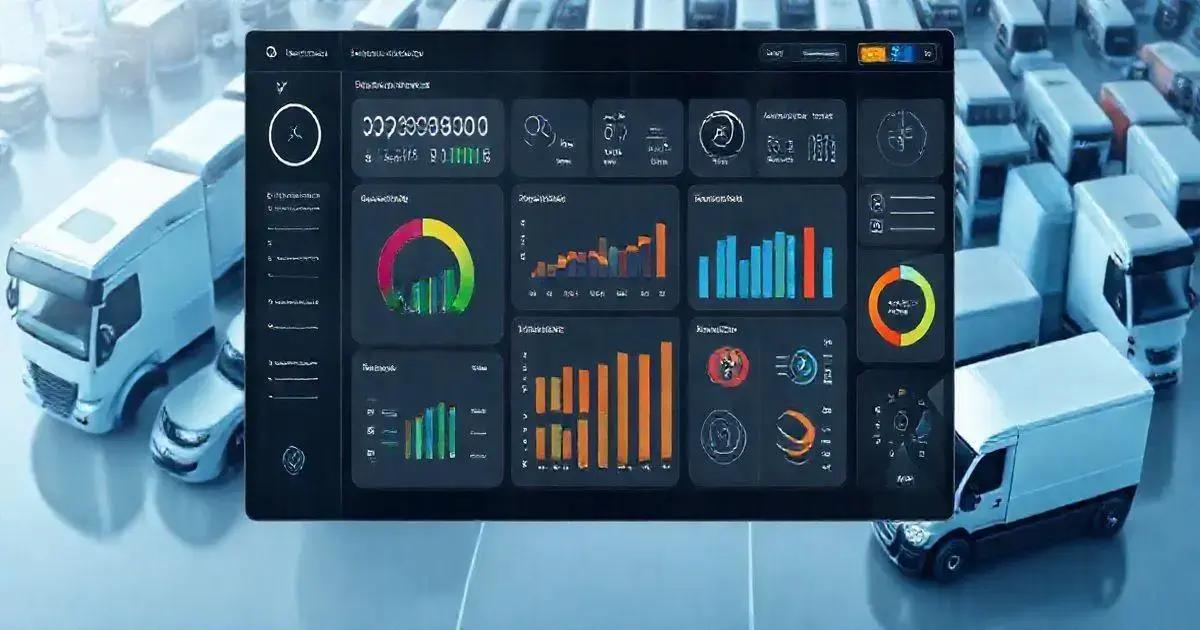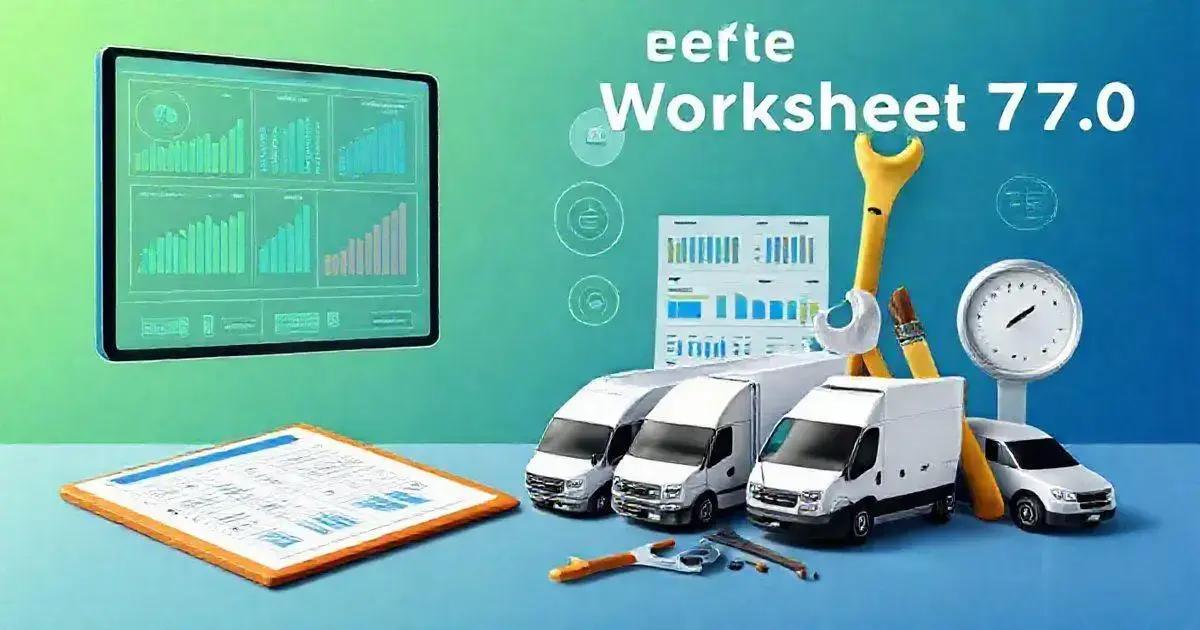Discover the Fleet Control Worksheet 7.0: Your Ultimate Tool Leave a comment
The Fleet Control Worksheet 7.0 is a management tool for fleet operations that enhances efficiency through features like initial dashboards for vehicle performance, comprehensive registrations for drivers and vehicles, document management for safety compliance, travel control insights for optimizing routes, and tire and maintenance tracking to ensure vehicle safety and efficiency.
The Fleet Control Worksheet 7.0 is designed to revolutionize how you manage your vehicle fleet. Whether you’re overseeing a few vehicles or an entire fleet, this template offers comprehensive tracking, maintenance logs, and insightful dashboards.
From fuel consumption rates to maintenance costs, you can keep tabs on all essential metrics that will help your operations run smoothly and efficiently.
Initial Dashboards Overview
The Initial Dashboards Overview of the Fleet Control Worksheet 7.0 gives you a snapshot of your fleet’s performance at a glance. These dashboards are designed to be user-friendly, allowing quick access to data that is crucial for making informed decisions.
Key Metrics Displayed:
- KM by Driver: Track the total kilometers driven by each driver, helping to identify patterns in driving behavior and usage.
- KM per Vehicle: Monitor the distance traveled by each vehicle, which is essential for scheduling maintenance and understanding vehicle usage trends.
- KM per Liter: Calculate fuel efficiency by measuring how many kilometers each vehicle travels per liter of fuel, an important metric for cost management.
- KM per Trip: Keep track of distances covered on individual trips, enabling better planning and resource allocation.
- Average Consumption per Vehicle: Analyze the average fuel consumption of each vehicle to manage costs and improve efficiency.
- Average Consumption per Driver: Evaluate how fuel consumption varies between drivers to identify best practices or training needs.
- Total General, Preventive and Corrective Maintenance: View an overview of all maintenance activities, ensuring that no vehicle goes overlooked for critical upkeep.
- Maintenance Cost Average: Assess the average costs incurred on maintenance to better budget and plan for future expenses.
- Total cost of Mechanical and Electrical Maintenance: Get a comprehensive view of what’s being spent on mechanical and electrical repairs, helping to forecast future maintenance needs.
- Total Tire Maintenance Cost: Keep track of all tire-related expenses, including replacements and repairs, to maintain optimal fleet safety and performance.
- Total Lubricant Cost: Monitor lubricant usage costs to help with inventory management and cost control measures.
- Average cost of Mechanical and Electrical Maintenance: This metric helps in understanding maintenance trends and identifying areas where costs can be reduced.
- Vehicles in Transit: Stay updated on which vehicles are currently in transit, aiding in operational management and logistics planning.
- Tires in Transit: Similar to vehicles, this metric captures the status of tires that are in transit, ensuring timely tracking and delivery.
- Delayed Vehicle Documents: Keep an eye on any pending documentation for vehicles to ensure compliance with regulations.
- Delayed Driver Documents: Just like vehicles, it’s essential to track driver documentation to avoid any legal issues.
- Delayed Preventive Maintenance: This metric is crucial for operational efficiency, ensuring that preventive maintenance is performed on time to prevent larger issues down the road.
- Total Cost Versus Shipping: Analyze the effectiveness of your shipping operations by comparing total costs against shipping revenue.
- Fuel, Maintenance and Other Costs: This comprehensive view helps you understand the relationship between fuel expenses, maintenance, and overall operational costs.
With these metrics readily available, fleet managers can make strategic decisions based on real data, improving efficiency and reducing costs in fleet management.

Comprehensive Registrations
The Comprehensive Registrations section of the Fleet Control Worksheet 7.0 is designed to streamline the management of essential data related to your fleet operations. This section enables you to maintain detailed records for each driver, vehicle, and service provider, ensuring that all critical information is stored in one convenient location.
Key Components of Registrations:
- Driver Registration: Capture essential details about each driver, including their name, license number, contact information, and any certifications. This information is vital for compliance and operational efficiency.
- Vehicle Type Registration: Document the specifics of each vehicle in your fleet. This includes make, model, year, registration number, and vehicle identification number (VIN). Knowing the attributes of each vehicle helps in maintenance scheduling and performance tracking.
- Mechanical and Electrical Services Registry: Keep a log of all mechanical and electrical services performed on each vehicle. This ensures that you have a record of all repairs and maintenance activities, which can help in budgeting and forecasting future service needs.
- Tree Service Registration: If applicable, maintain records for tree services that may be associated with your operations, including service providers and contact details for quick access.
- Lubricant Services Register: Track the lubricants used in the maintenance of vehicles. This includes types of lubricants, quantities used, and service dates, which is crucial for ensuring proper vehicle care.
- Register of Workshops and Suppliers: Document all workshops and suppliers you work with for maintenance services, parts, and repairs. This registry ensures that you have quick access to trusted service providers when needed.
- Expenditure Type Register: Create a detailed list of all expense categories related to fleet operations. This can include fuel, maintenance, insurance, and repairs, helping you track and manage costs effectively.
- Refueling Station Registration: Maintain a list of refueling stations that are frequently used. This helps in managing fuel purchases and can also aid in optimizing routes for drivers.
- Fuel Type Register: Keep track of the different types of fuel used in your vehicles. This information can be beneficial for understanding fuel consumption and making informed decisions about fuel purchases and vehicle usage.
By utilizing the Comprehensive Registrations feature, fleet managers can ensure that all relevant data is organized and easily accessible. This not only enhances the efficiency of day-to-day operations but also supports informed decision-making in fleet management.
Document Management Features
The Document Management Features within the Fleet Control Worksheet 7.0 serve as a vital component in ensuring that all necessary documentation related to your fleet is meticulously organized and easily accessible. Proper management of these documents can significantly enhance compliance, safety, and operational efficiency.
With the Document Management Features integrated into Fleet Control Worksheet 7.0, you can automate reminders for document renewals, ensuring that you are always prepared for inspections and audits. This proactive approach helps minimize operational risks and enhances the overall reliability of your fleet management.
Essential Document Management Features:
- Driver Document Control: This feature allows you to track and manage all essential documents for each driver, such as licenses, certifications, and medical examination reports. Keeping this information organized helps ensure compliance with local regulations and reduces the risk of legal issues.
- Vehicle Document Control: This function manages all documentation required for each vehicle in your fleet, including registration papers, insurance documents, and inspection reports. Maintaining up-to-date records is crucial for regulatory compliance and planning for renewals.
Benefits of Efficient Document Management:
- Improved Compliance: By keeping track of all necessary documents, you can ensure that you comply with regulatory requirements, reducing the risk of fines or penalties.
- Enhanced Safety: Having easy access to driver qualifications and vehicle safety records ensures that only qualified drivers operate your vehicles, promoting a safer driving environment.
- Time Savings: Centralized document management streamlines processes, allowing fleet managers to spend less time searching for documents and more time on strategic planning.
Overall, the Document Management Features within the Fleet Control Worksheet 7.0 provide a comprehensive solution for managing critical documents effectively, leading to better compliance, increased safety, and enhanced operational efficiency.

Travel Control Insights
The Travel Control Insights section of the Fleet Control Worksheet 7.0 is designed to provide fleet managers with a comprehensive overview of travel-related metrics and expenses. This feature allows for meticulous tracking of all trips, ensuring that every detail is captured for operational efficiency and cost management.
Key Aspects of Travel Control:
- Cargo Control Linked to Trips: Track the cargo loads associated with each trip. This helps in understanding the volume of goods transported and optimizing load management for future trips.
- Vehicle Control: Manage and monitor which vehicle is assigned to each trip. This feature ensures that vehicle usage is optimized and helps in scheduling maintenance based on travel frequency.
- Driver Control: Keep a detailed log of which driver is operating each vehicle during trips. This information is crucial for performance evaluation and accountability.
- Supply Control: Monitor the supplies used during trips, including fuel and any other resources. This helps in budgeting and forecasting future operational costs.
- Control of All Travel Expenses: Capture all expenses incurred during trips, including fuel, tolls, maintenance, and any other costs. This comprehensive tracking aids in identifying areas where costs can be reduced.
By implementing these travel control insights, fleet managers can gain a better understanding of operational efficiency, identify trends in travel behavior, and make data-driven decisions to enhance productivity.
Benefits of Effective Travel Control:
- Cost Reduction: Tracking travel expenses meticulously allows for identifying unnecessary costs and implementing cost-saving measures.
- Enhanced Planning: With clear insights into travel patterns, fleet managers can optimize routes and schedules, leading to improved delivery times and customer satisfaction.
- Data-Driven Decisions: Having access to detailed travel reports empowers managers to make informed decisions regarding fleet operations and resource allocation.
In summary, the Travel Control Insights feature of Fleet Control Worksheet 7.0 provides the necessary tools for comprehensive travel management, leading to better cost control, improved operational planning, and increased efficiency in fleet management.
Tire and Maintenance Tracking
The Tire and Maintenance Tracking feature in the Fleet Control Worksheet 7.0 is essential for ensuring that your vehicles operate safely and efficiently. It allows fleet managers to monitor tire usage and maintenance activities, ultimately prolonging the lifespan of vehicles and enhancing safety on the road.
Key Components of Tire and Maintenance Tracking:
- Tire Identification: Keep track of each tire’s identification details, including type, size, and purchase date. This information is crucial for managing tire inventory and ensuring compliance with safety standards.
- Tire Change Schedule by KM: Set up a routine for changing tires based on kilometers driven. This proactive approach helps prevent tire-related issues and enhances vehicle performance.
- KM Left for Tire Change: Monitor how many kilometers remain before a tire change is required. This tracking enables fleet managers to anticipate and schedule tire replacements before they become an issue.
- Status per Action: Keep track of the status of each tire with actions such as allocation to a vehicle, removal from a vehicle, scrapping, or maintenance. This ensures that all operations are documented and tracked effectively.
- Maintenance Control: Document all maintenance activities related to tires, including regular inspections, repairs, and replacements. This comprehensive log assists in budgeting for future tire expenses and understanding the total cost of ownership.
Implementing effective tire and maintenance tracking mechanisms can lead to significant improvements in vehicle safety, reliability, and overall performance. Fleet managers can make informed decisions based on the data collected, enhancing the operational integrity of their fleet.
Benefits of Tire and Maintenance Tracking:
- Increased Safety: Regular monitoring of tire conditions and timely maintenance ensures that vehicles are always roadworthy, greatly reducing the risk of accidents.
- Cost Efficiency: By preventing tire-related failures and ensuring timely replacements, fleets can save on emergency repairs and downtime costs, leading to better budget management.
- Extended Tire Life: Proper tracking and maintenance of tires can extend their lifespan, providing better return on investment and reducing the frequency of purchases.
In conclusion, the Tire and Maintenance Tracking feature within the Fleet Control Worksheet 7.0 not only enhances safety but also contributes to efficient fleet management, making it an invaluable tool for any fleet manager.
Conclusion
The Fleet Control Worksheet 7.0 is a powerful tool designed to streamline fleet management through comprehensive features such as Travel Control Insights, Tire and Maintenance Tracking, and Document Management Features.
By integrating these functionalities, fleet managers can achieve enhanced operational efficiency, improved safety, and significant cost savings.
With the detailed dashboards and tracking capabilities, you can make informed decisions that lead to better resource allocation and optimized vehicle performance.
The emphasis on timely maintenance and thorough documentation management ensures compliance and prolongs the life of your fleet.
In an industry where efficiency and safety are paramount, adopting the Fleet Control Worksheet 7.0 can give you the competitive edge needed to succeed.
Embrace the future of fleet management and transform how you operate today!
FAQ – Frequently Asked Questions about Fleet Control Worksheet 7.0
What features does the Fleet Control Worksheet 7.0 include?
The Fleet Control Worksheet 7.0 includes features such as Initial Dashboards, Comprehensive Registrations, Document Management, Travel Control Insights, and Tire and Maintenance Tracking.
How can I track tire maintenance effectively?
You can track tire maintenance by using the Tire and Maintenance Tracking feature, which allows you to monitor tire usage, schedule changes based on kilometers driven, and log maintenance activities.
Is the Fleet Control Worksheet 7.0 suitable for small fleets?
Yes, the Fleet Control Worksheet 7.0 is designed for all fleet sizes, from small businesses managing a few vehicles to larger operations with extensive fleets.
Can I customize the worksheet to fit my specific needs?
Yes, the worksheet is customizable, allowing you to adapt it to meet your specific fleet management requirements.
What are the benefits of using a fleet control worksheet?
Using a fleet control worksheet helps enhance operational efficiency, improve safety, reduce costs, and provide insights for informed decision-making.
Is support available if I encounter issues with the worksheet?
Yes, technical assistance is available to help you with any issues related to the Fleet Control Worksheet 7.0.

